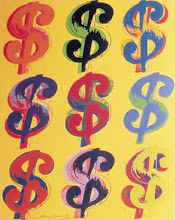Some may have noticed a recent request by the journal Cultural Trends to seek out reviews of grey literature. One of the goals for this blog is to explore terms of art used by the state and other organizations for rhetorical practice because these ways of describing rhetorical practice have specific histories, and are often regulated in ways that require much more scrutiny. For example, lobbying and Electioneering Communication are two ways public policy conceptualizes rhetorical practice. Grey literature would be another term of art used to describe rhetorical practices. Grey literature would seem to be a world wide object of study as there have been ten international conferences on grey literature, the most recent one in December 2008.
In 1995, the U.S. Interagency Gray Literature Group defined Grey literature as "foreign or domestic open source material that usually is available through specialized channels and may not enter normal channels or systems of publication, distribution, bibliographic control, or acquisition by booksellers or subscription agents." The Fourth International Conference on Grey Literature defined it as "That which is produced on all levels of government, academics, business and industry in print and electronic formats, but which is not controlled by commercial publishers." According to Irwin Weintraub the goal of grey literature is "to disseminate current information to a wide audience." As the call from Cultural Trends suggests, grey literature informs policy making and its informational content is often put to persuasive ends. Finally, the Wikipedia entry notes that grey literature has particular relevance to the "intelligence community, librarians and medical and research professionals."
Since grey literature seems to be such an important genre for creating social knowledge and shaping public opinion and public policy, rhetorical scholars might want to add grey literature to their professional concerns as well. For those with an interest in keeping track of grey literature Greynet looks to be an important resource.
Thursday, April 23, 2009
Tuesday, April 21, 2009
Bio-Capital and the Social Relations of Reproduction
Today's campus newspaper reports that there has been a "25 percent increase in the number of women applying to be egg donors, a trend some experts attribute to college students looking to make an average of $5000 in a rough economy." The gendering of the entrepreneurial self. Yet, it would seem the preference is for more regulation to better ensure that the psychological motives for donation are more "altruistic" than financial. My favorite line is from the medical ethicist: "We are not commodifying human beings." We're compensating people for their trouble and their time." Note the abstraction from the particulars of the body: people not women, and the "trouble and time," not eggs. Time is money and the ethical here is re-formulated to support an abstract social relationship of exchange predicated on the proper psychological, medical, and physical disposition of the donor. We might call the cultivation of this proper disposition learning to labor in the reproductive economy.
Tuesday, April 14, 2009
What do boy's want?
I wonder whether or not pornography is a genre of money/speech. On that theme I note the following juxtaposition in the NYT today April 14, 2009. Front page: What do Boys Want? She Digs into the Minds and Closet to See. This is an article about Kelly Pena's research on 12 year old boys for Disney. Turn Page to A 18: Obituary: Marilyn Chambers, 56, Sex Star Dies. Quote from the Obit: "Behind the Green Door" was more than just a parade of sex scenes, said Steven Hirsch, the co-chief executive of Vidid Entertainment Group, which makes adult films, Even thought MS. Chambers did not actually have any lines in the film, he said, she brought it to life." What was the question again?
Subscribe to:
Comments (Atom)



